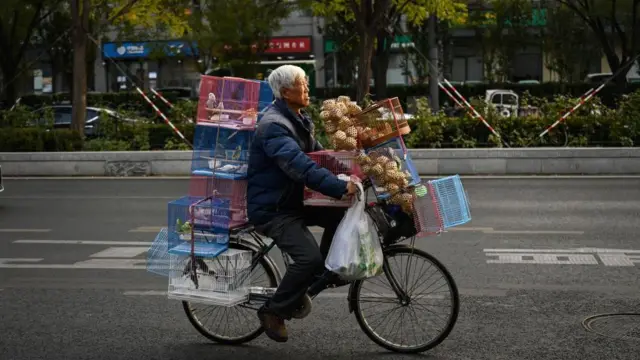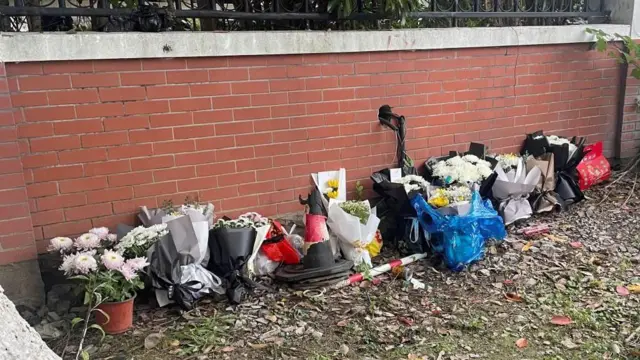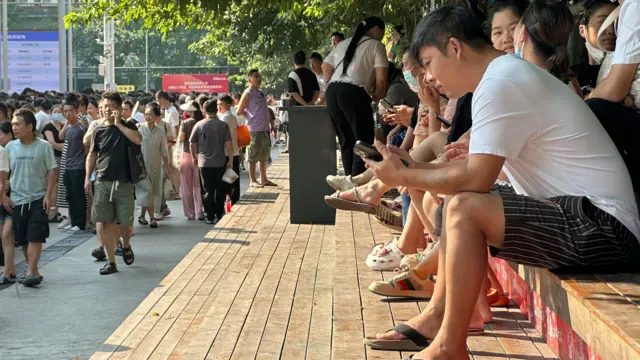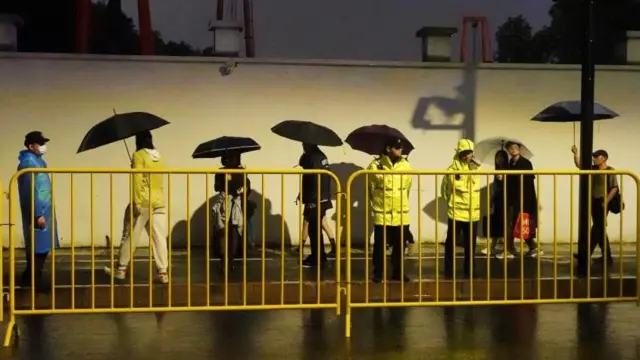A year of massive, indiscriminate attacks reveals anger and frustration in China

“The Chinese people have suffered so much,” one user wrote on social media earlier this year after another mass murder in China. The user also warned that “copycat attacks like this will only increase.”
Another user wrote, "This tragedy reflects the darkness in society."
As 2024 has seen a spate of deadly attacks in China, these gloomy comments have raised questions about what would drive people to "retaliate against society" by killing strangers on a large scale?
David Schak, an associate professor at Griffith University in Australia, said such attacks were still rare in China, given its large population, but were not new. However, they appeared to be coming in batches, usually by copycats trying to attract attention.
This year has been particularly painful.
From 2019 to 2023, police recorded three to five cases each year in which perpetrators attacked pedestrians or strangers.
But in 2024, the number jumped to 19.
In 2019, three people died and 28 were injured; in 2023, 16 people died and 40 were injured; in 2024, 63 people died and 166 were injured. November was particularly bloody.
On November 11, a 62-year-old man in Zhuhai drove his car into a crowd exercising outside a stadium, killing at least 35 people. The perpetrator was sentenced to death this week after police said he was unhappy with a divorce settlement.
Days later, in Changde, a man drove his car into a group of children and parents outside a primary school, injuring 30 people. Authorities said the man was angry about financial losses and family problems.
In the same week, a 21-year-old man who was unable to graduate because he failed an exam carried out a knife attack on a campus in the city of Wuxi, killing eight people and injuring 17.
In September, a 37-year-old man broke into a shopping mall in Shanghai and stabbed people. In June, four American teachers were attacked with a knife by a 55-year-old man in a park. There were also two attacks on Japanese citizens, one of which resulted in a 10-year-old boy being stabbed to death at the school gate.

Professor Schack noted that the perpetrators of these attacks mainly targeted "random people" to express their "frustration with society."
In a country with extensive surveillance capabilities, where women rarely hesitate to go out alone at night, the attacks have stirred widespread unease.
So what has caused so many large-scale attacks in China this year?
China's economic slowdown
One of the main pressures facing China right now is slowing economic growth. As we all know, China is facing high youth unemployment, massive debt and a real estate crisis, which have depleted many families' life savings, and some even have nothing left.
In the suburbs of most major cities, the construction of entire residential areas has stopped because debt-ridden developers are unable to complete the projects. In 2022, the BBC reported that some people were sleeping rough in their unfinished apartments, without water, electricity, or windows, because they had nowhere else to go.
“The optimism does seem to have evaporated,” said George Magnus, a research fellow at the China Centre at Oxford University. “We can use the word ‘trapped’ for now. I think China has been caught in a cycle of repression. On the one hand, there is social repression and economic oppression, and on the other hand, there is a shaky economic development model.”
Research shows that Chinese people's attitudes have changed significantly, and their pessimism about their personal prospects has increased. A joint Sino-US analysis survey showed that in the past people often attributed social inequality to personal efforts or lack of ability, but recent survey results show that people now blame it on an "unfair economic system."
“The question is, who do people really blame?” Magnus asked. “And the next step is, the system is unfair to me and I can’t break through. I can’t change my situation.”
Lack of a way out
In countries with healthy media ecosystems, if you feel you were unfairly fired or your home was demolished by a corrupt builder backed by the local government, you might turn to a journalist to get your story heard. But in China, this rarely happens because the media is controlled by the Communist Party and is unlikely to report news that damages the image of governments at all levels.
Moreover, the courts—run by and for the party—are slow and inefficient. Social media is full of speculation about the Zhuhai attacker’s motive: he could not reach a divorce settlement in court that he considered fair.

Experts point out that other channels for venting frustration are also shrinking or closing altogether.
Lynette Ong, a professor of political science at the University of Toronto who studies how the Chinese government responds to popular resistance, said Chinese people often express their discontent online.
“[They] will curse the government online … just to vent their anger. Or they might organize a small protest, and if it’s small, the police will usually allow it,” she explained. “But that kind of dissent, small dissent, has been blocked over the past few years.”
Examples abound: stepped-up online censorship that blocks speech deemed controversial or critical; a crackdown on Halloween costumes that mocked officialdom; and, when residents of Henan province protested over bank account freezes, plainclothes officers, apparently at the direction of local officials, beat demonstrators.
In addition, the response to people's emotional and psychological reactions is also inadequate. Experts point out that counseling services in China are extremely scarce, which makes it difficult for those who feel isolated, lonely and depressed in modern Chinese society to find an outlet.
"Counseling can help build emotional resilience." Sylvia Kwok, a professor at City University of Hong Kong, said China needs to increase mental health services, especially for high-risk groups who have experienced trauma or have mental health problems.
"People need to find different strategies or constructive ways to deal with their emotions ... to reduce the likelihood that they will react violently in times of intense emotional stress."
Taken together, these factors suggest that the lid is tightening on Chinese society, creating a pressure-cooker situation.
“It’s not that a lot of people are committing mass murder. But tensions seem to be rising, and at this point it seems unlikely that they will be relieved,” Magnus said.

What the Communist Party should be worried about is that the public will blame those in power for this.
Take this comment, for example: "If the government could really be fair and impartial, there wouldn't be so much anger and dissatisfaction. The government's efforts are only to create a superficial harmony, seemingly caring about the disadvantaged, but in fact it has caused the greatest social injustice."
Wang Huiling said that while violent attacks are on the rise in many countries, China is different in that officials have little experience dealing with such incidents.
"I think the authorities were very shocked because they hadn't seen this before and their instinct was to crack down."
When China's leader, Xi Jinping, spoke about the Zhuhai attack, he seemed to acknowledge that social pressure was building. He urged officials across the country to "learn profound lessons, apply what happened to other situations, strengthen prevention and control of risk sources, resolve conflicts and disputes in a timely manner, and strictly prevent extreme cases from happening."
But so far, the lesson learned appears to be to increase surveillance to allow police to respond more quickly, rather than to consider any changes to the way China operates.
“China is entering a new phase that we haven’t seen since the late 1970s,” said Wang Huiling, referring to a period of great change as China reopened to the outside world.
“We need to be prepared for unexpected events, such as large numbers of random attacks, small-scale protests and social instability.”555
Comments
Post a Comment